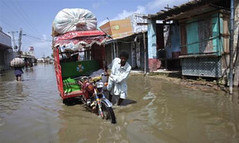Water is key to food security. Meeting mounting food needs of a burgeoning population increasingly depends on efficient use of the water. That is possible if people are educated about its prudent use.
According to the a UN Water, “Food security exists when all people, at all times, have physical, social and economic access to sufficient, safe and nutritious food to meet their dietary needs and food preferences for an active and healthy life.” Water is fundamental to that security.
Climate change has emerged as a grave threat to rapidly depleting freshwater resources – a scenario that calls for urgent measures at levels from government to farmers for efficient water management.
According to Freshwater Under Threat: South Asia, a report of the United Nations Environment Programme (UNEP), per capita availability of water in the Indus basin, which lies below the Hindu Kush, Karakorum, and Himalayan mountains and is shared by Afghanistan, China, India, and Pakistan, is nearly 1,329 cubic metres per year.
According to the World Resource Institute, a basin reaches ‘‘water stress’’ when per capita water supply is less than 1,700 cubic metres per year.
But water availability per capital in Pakistan is much less – below 1,100 cubic meters a year, down from 5,500 meters a year in 1950, according to government reports.
“Unsustainable mining of underground water for agricultural, industrial and domestic purposes, inadequate application of water-efficient technologies by farmers and lack of industrialists’ interest in adopting water recycling technologies for one or other reason, and lack of awareness among domestic consumers are the main causes of the present gruesome state of water resources in the country”, said Ali Tauqeer Sheikh, Asia director for theClimate and Development Knowledge Network (CDKN) and head of LEAD Pakistan, an organisation focused on the environment and sustainable development. More
